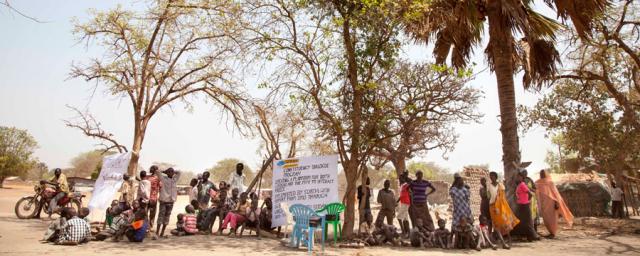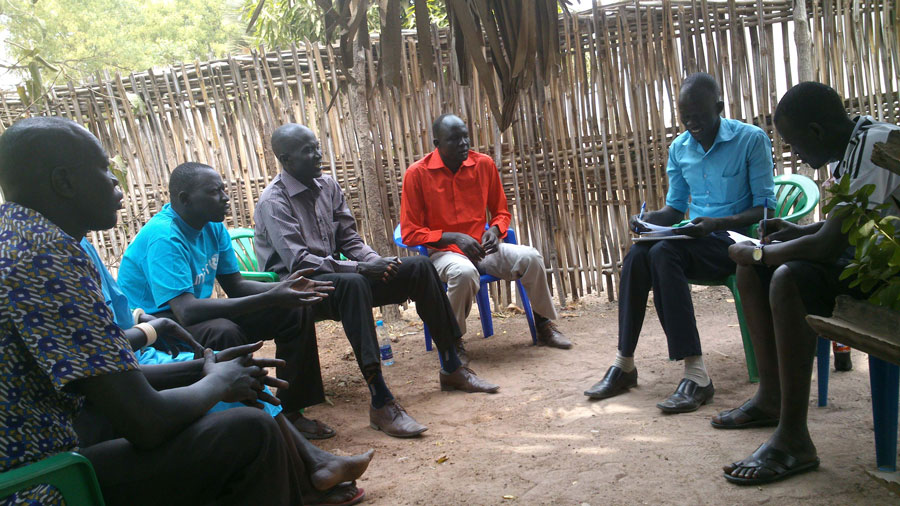
The people of South Sudan fought for decades to earn their independence. Barely four years after becoming the world’s newest nation, conflict broke out in Juba and quickly spread to other areas of the country. Rumbek, the capital of Lakes state, is still feeling the repercussions. The current conflict uprooted thousands, forcing them to leave their homes, separating them from their loved ones.
The current generation has not lived in peace. Just after celebrating independence, they were soon confronted with yet another war. The number of young people losing their lives because of inter-communal attacks — cattle raiding, or revenge attacks, is rising.
The roots of the inter-communal conflict in Rumbek, are complicated with many overlapping issues.
It includes unaddressed long-term and historical grievances between communities, competition and access over limited resources, the ever spreading proliferation of arms particularly among politically and economically marginalized youth, and the inability of the state to protect it’s people, or for people to gain access to justice or accountability.
Encourage dialogue to address the roots of conflicts
Therefore, any solutions to address the ongoing violence should aim to encourage dialogue between communities to address the underlying drivers of such conflicts, including addressing the proliferation of small arms, providing alternative livelihoods for youth, as well as providing better protection to people and strengthening justice and accountability mechanisms.
Oxfam has been working closely with communities and their leaders in Rumbek to establish peace committees that are now avenues for different clans to meet on a regular basis to discuss issues, mediate conflicts and encourage peaceful co-existence.

Mayom peace committee meeting in Rumbek, led by Deng Maketch (in red) who has been the chairman of the Rumbek peace committee since July 2014. Photo: Saidia Jackie/Oxfam
The Mayom peace committee came together because they were not happy with the current situation in Rumbek. Their sons were dying, and they needed to stop it. Over Twenty years of war wiped out a whole generation and they did not want a repetition of that. The peace committee includes representatives from women, the youth and the community leadership that resolve disputes and do their best to promote peace in Rumbek.
“Our job is to intervene when tensions build up and fighting erupts. When people disagree and start fighting or threatening to fight, we step in and encourage dialogue and discussion as an alternative.” says Deng Makuetch, who has been the chairman of the Rumbek peace committee since July 2014.
Revenge killings are difficult to address because they are entrenched in some clan cultures. Changing a practice that has been used for generations is not easy, but peace committees are finding constructive ways to address it.
Rebecca Adut, a member of the peace committee, is from the Amayom clan in Rumbek. When her husband passed on in 2014, she was left to care for her four children alone. He was from the Rup clan, also in Rumbek.
“Revenge would not bring my son back, or bring anyone any peace”
When her third son Gabriel was 21 years old, he was requested by his father’s clan to move to the Rup cattle camp to handle the family’s cattle. Gabriel agreed to the request and left school, despite reservations from his mother. Tragedy struck when the Amayom clan attacked the cattle camp. A stray bullet left Gabriel dead after the exchange. Immediately after, the Rup clan geared up to revenge their son’s death, and requested that Abraham, Rebecca’s last born son, join them in their quest.
“As soon as my family heard about it, they prepared themselves to travel to Rumbek to kill whoever was responsible. They came to my home and asked for my last child. I did not agree to their request this time. If Abraham went back with them, he would die, or have to kill someone. That is not the kind of future I want for him. Either way, it would not bring my son Gabriel back, or bring anyone any peace.”
“It was not easy to say no, and even harder for people to understand why revenge was not a solution. My family, from the Amayom clan, was not happy with me. I travelled back and forth between the clans for seven months before the Rup and Amayamo agreed to talk. I spoke with them and told them that instead of selling their cattle to buy guns, they should rear their cattle to maturity, and use them to earn a living.” said Rebecca. “This is not the tradition for anyone here. They did not understand why I was stopping them from pursuing revenge. I went through a very difficult time, but after some time, the Rup agreed not to avenge my son.”
Abraham’s support was instrumental in getting the two clans to speak. By refusing to follow his family to avenge Gabriel, he gave his mother solid ground to oppose his relocation. “If Abraham wanted to avenge his elder brother, I would not have succeeded. A mother’s love can only go so far. It is because he didn’t want to be involved that we were able to avoid any more unnecessary death.”

Rebecca Adut, from the Amayom clan, member of the peace committee in Rumbek. Photo: Stella Madete/Oxfam
Rebecca is now using this experience to lift her community from the destructive revenge cycle of killing and to show that there are alternatives to death. “I joined the peace committee to stop the death of our sons. We have lost too many. When I go and speak to communities, I tell my story and people cry. No parent wants to outlive their child. I hope that people listen and communities decide that this will be a thing of the past.”
The peace committee is also doing its best to sensitize communities on alternatives to conflict by hosting regular talk shows on radio and organizing peace rallies in town. They also work with local authorities to ensure that they are passing the same messages.
“Traditionally, chiefs were responsible for peoples’ well-being and resolved any rising issues. After the crisis, more and more people moved to Rumbek town, and there were more disagreements and therefore more mediation was needed,” says Deng Makuetch. “We now work together to resolve issues that come up, and they welcome the support. We also work with the county government, especially on armed violence and the possibility of disarmament.”
Change does not come overnight. More work is needed to ensure that additional lives are not lost. The establishment of peace committees is a bold step in the right direction to ensure that the hopes that were interrupted in December 2013 are realized.
